Take in a few deep breaths – we know you’re nervous.
You have reached the final interview stage after applying for that data scientist position and excelling all your skills tests. Congratulations!
Now let’s talk about our game plan:
How are you going to exceed your employer’s expectations and get the job?
Based on our experiences with data science job interviews, we’ll show you how to prepare beforehand and present yourself as the data scientist employers are looking for.
What do we need to know beforehand?
The most common mistake applicants make in data scientist interviews is that they are either over-prepared, or under-prepared.
It’s hard to tell how much you need to prepare for an interview. The amount of preparation you need depends on the job and position you are applying for.
But you can make smart assumptions on what you need to prepare and how you should present your work.
For example, you know that you need to prove that you have the programming skills needed for the job.
That means you need to present a portfolio as evidence; you can’t show up to an interview empty-handed. But at the same time, your employers aren’t going to look through every single project you’ve done when they are going to meet twenty other candidates after you.
A good way to present your portfolio is to handpick your best projects that relates to job they need you to fulfill.

It is not how much you prepare that matters, but what you prepare before the interview.
Here are things you must prepare and know about before you enter your interview.
Know What Companies Are Looking For
As we enter the digital era, every company is searching for data scientists. It is predicted that in 2022, the most of the top 10 in-demand jobs will be in the data science field.
But even though the job position is labelled ‘data scientist’, it may not be what you expect.
Many companies do not understand that data science is a large subject area, just like engineering and medicine. It has many niches and specializations including:
- Data Analytics
- Full Stack
- Artificial Intelligence
- Machine Learning
- Data Visualization
- UX (User experience) Design
Due to this misunderstanding, many employers use ‘data scientist’ as a fancy catch-all term for a general computer programmer without any specialization.
If you are not careful, you may end up redesigning a website in market research when you thought you were going to program AI and complex automation.
To avoid this problem, look carefully at the job description and find the purpose behind the listed responsibilities. They will tell you what problem that company is trying to fix and the type of programmer they are looking for.
For example, let’s look at this data scientist posting on LinkedIn:
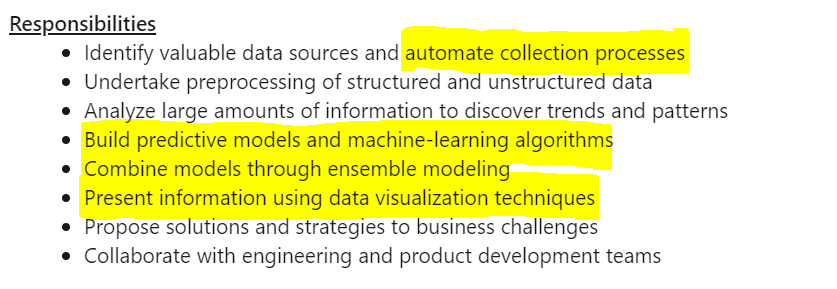
In this job description, we can see that this company is looking for a data scientist who can program automations, build models and visualize data. Sounds like they need a data scientist who specializes in modelling and data visualization right?
However, if you take a closer look, we can see that the company wants a data scientist to obtain marketing insights from data.
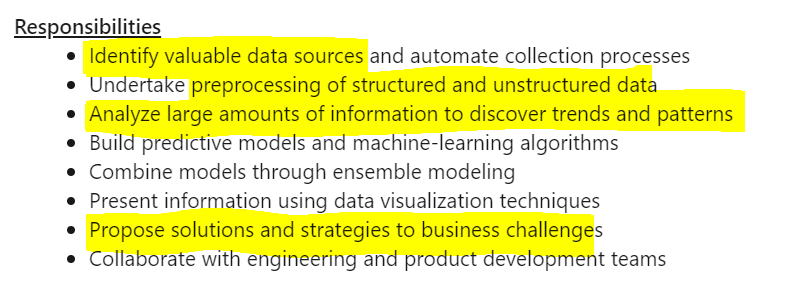
In other words, they are looking for a data analyst.
However, not all job descriptions will be clear about their responsibilities. Another way to understand what companies are looking for is to research your employer.
As you browse through the company’s website or explore their social media page, understand what stage their company is at (start up, growing etc.) and where they might use data in their work.
From there, you will have a good idea of what their issue is and what they want.
Specialize in a Niche
Let’s correct a common myth:
You don’t need to know everything about data science to get a job.
As we said before, data science is a huge field with many subjects that you can specialize in. Trying to learn everything in data science is impossible.
Instead, you should be targeting jobs that match with your skillset and niche.
When companies hire data scientists, they usually have a specific purpose they want the data scientist to fill or achieve. They don’t need you to know everything about data science. They only need you to be good at certain skills that help them achieve their goals.
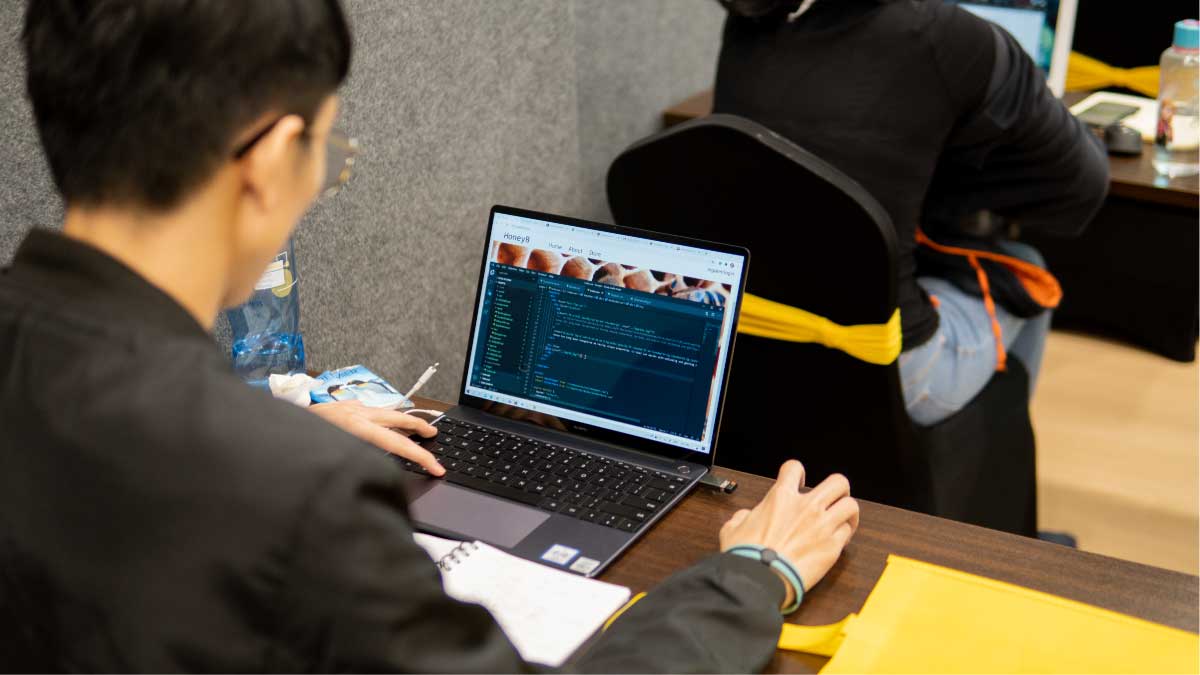
If you haven’t found your niche, learn the basics of data science first. Once you have gotten the exposure and experience from all subject areas, you will know what are your strengths and weaknesses.
From there, you can choose a data science field to master in based on your interests and strength.
If you are looking for a place to start learning data science 101, you can attend one of our 360 classes on data science or python.
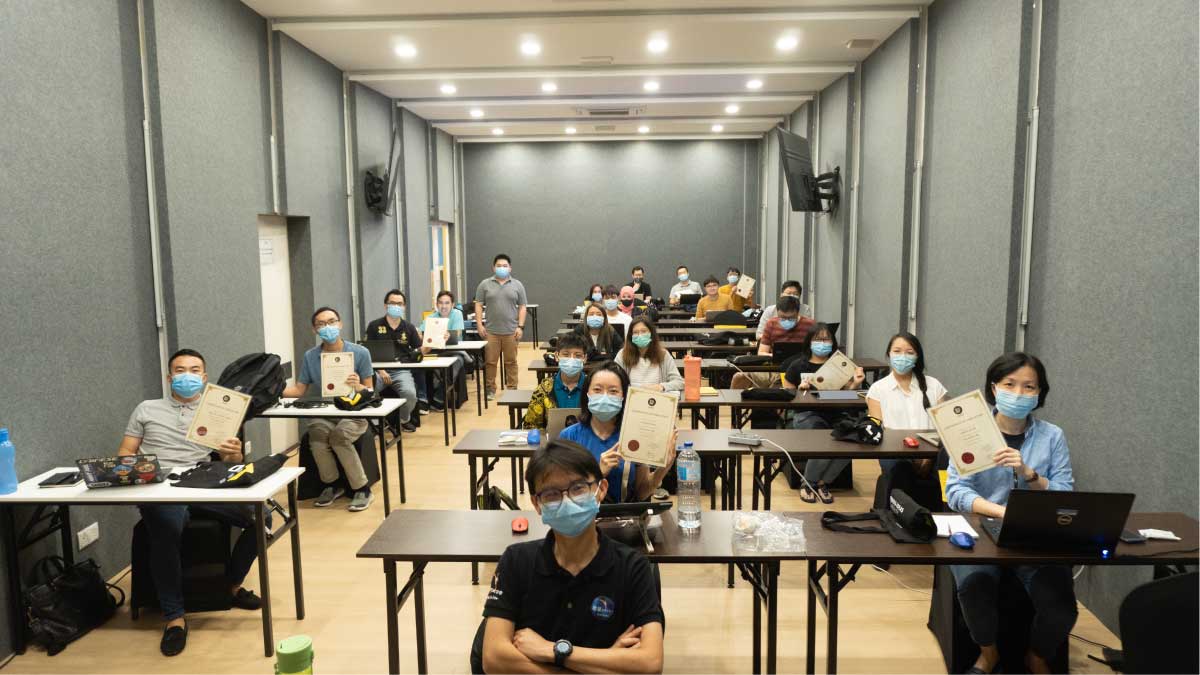
By specializing and targeting jobs in your niche, you will become a more suitable candidate to your employers compared to other candidates. In fact, specializing in a niche will increase your chances of getting a job rather than being an all-rounder.
Skills above Experience
Don’t worry about not having too much experience in the field.
While experience is something that employers look out for, it’s your capabilities and skills that companies that matters.
However, this does not mean you should not be seeking experiences because experiences can still develop your data science skills in new ways with different projects.
If you are new to the industry, you can make up for your lack of experience by doing research on the data science industry and becoming familiar with its lingo and terminology.
Making an effort to understand what’s going on in the industry shows your employers that you are actively interested in what you do. Even if you can pick up only a few lingo, it gives you a head start on your job.
What should I prepare before a data science interview?
If you have done your research, then you know what problem they are looking to tackle.
Use that information to your advantage as you prepare yourself and your materials, mainly your portfolio.
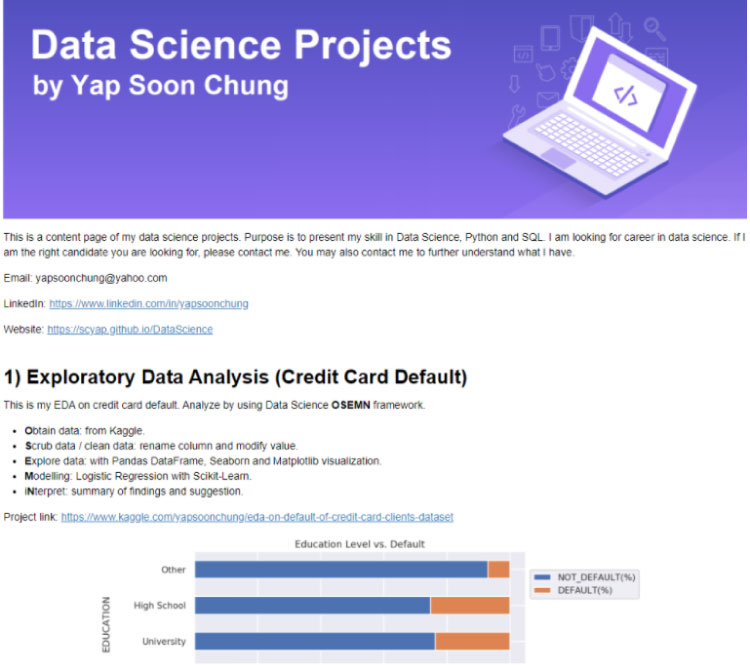
Based on the experience of one of our instructors, Dr. Lau, you will be ahead of at least half of the candidates just by preparing your portfolio.
Within your portfolio, you should put together case studies that relate to the problem the company is focusing on and present how you went to solve that problem.
If you haven’t done a project that relates to your job or are afraid of disclosing private information, you can create your own sample projects from existing data available online.
Thankfully, America and Australia have gathered lots of data and case studies that you can find easily on kaggle. Recreate those studies with your own techniques and annotate notes about your thought process.
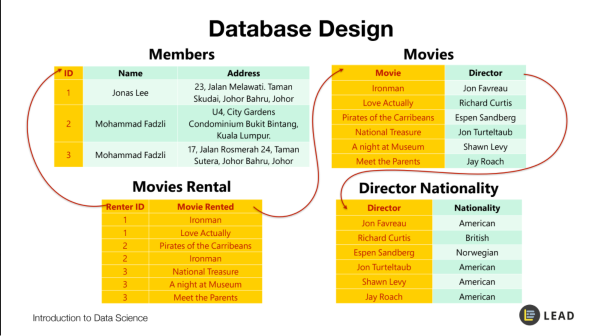
This tells your employers that you have paid careful attention to their needs in their job description and signals them to realise you’re the one they should hire.
But how do you stand out from the other half of candidates?
Exceed your employer’s expectations by providing both a hardcopy and softcopy of your portfolio.
While preparing both versions of the same portfolio may seem tedious, it actually gives a strong impression of you to your employers who may have only received web portfolios. You want to be remembered by your employers and increase your chance of being hired.

The hardcopy and softcopy of your portfolio doesn’t have to be identical either. Selectively choose and organise your portfolio that best showcase your work.
There are two types of soft copy portfolio that you will have. First is your LinkedIn account.
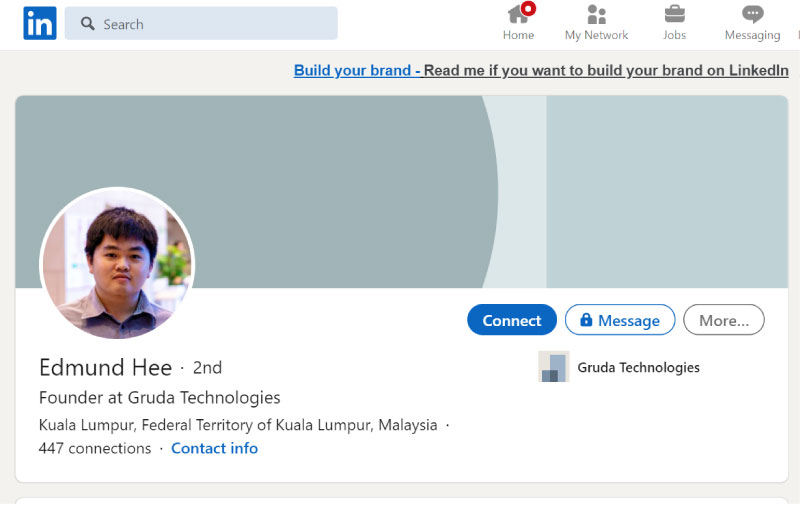
When employers look at your LinkedIn account, they are noticing how active you are in your field of work as they look at your experience and expertise.
To show that you’re an active, contributing member to the industry, used LinkedIn as your platform to produce or share content related to your field.
The second is your GitHub account. GitHub is a code repository account where you can develop various kinds of software, including your own web portfolio.
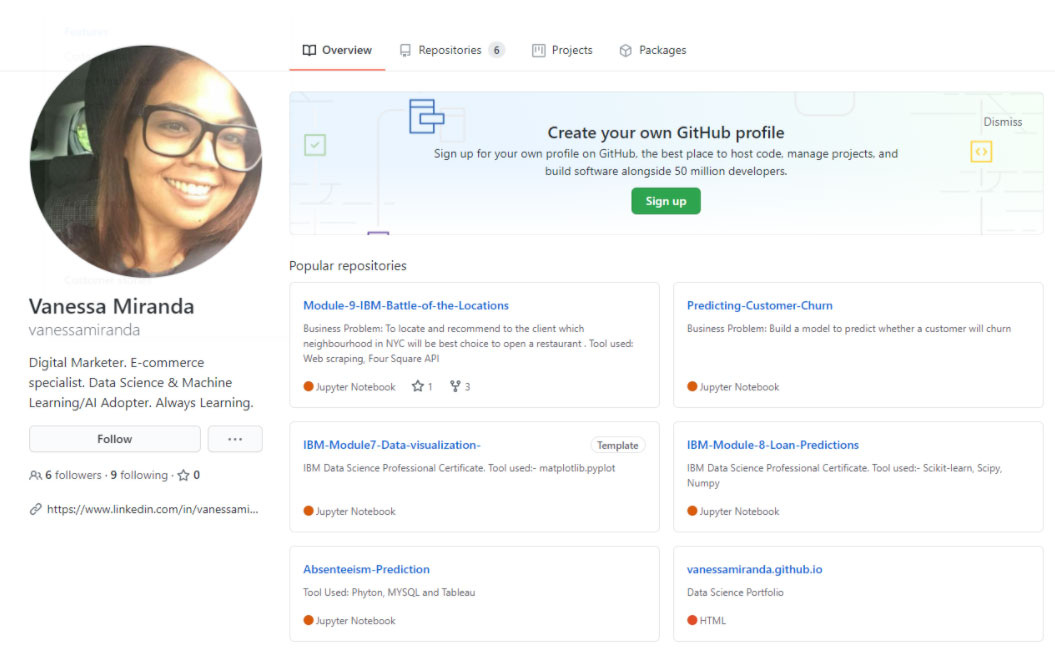
Employers will pay careful attention to your web and UX design as it is the first piece of work that showcases your programming skills. So pay extra attention into creating a clean, well organised portfolio.
The bottom line: your portfolio must signal that you are the right candidate for the job.
We go into more detail on how you can present your portfolio here in our Data Science Interview Recipe.
How do I present myself during a data science interview?

You have done your research and prepared all the materials necessary for your interview.
But you still feel nervous, maybe even under-prepared: how are you going to present yourself to your future employer?
First off, relax. No matter how professional a company is, you are still talking to human beings, not robots.
The purpose of interviews is for your employers to get to know you better and vise versa. So when it comes to formalities, just be yourself and naturally show your likable side. In this way, you will leave a good impression of yourself to your audience.

Be genuine. If you cannot do a certain task, tell your potential employer of limits and what you have yet to achieve. Employers will appreciate your honesty and are more likely to hire you due to your humble character.
Of course, there needs to be a form of professionalism to show respect. This depends on your employer.
If they are a huge corporation, you would be dressed in a suit or a nice blouse with a plain bottom. But if your employer is a small business or a start up, smart casual would be more appropriate as small businesses tend to be more casual.
In other words: your outfit should be suitable and presentable for your potential employer.
Final thoughts on preparing for a data science interview
The main takeaway for a successful interview is to present yourself as a solution to your employers’ needs.
Because in the end, they are hiring you based on what you can do, but on what you can do for them.
But wait, we forgot the most important part!
How do we answer the interview questions? Is there a way we can prepare for that?
That is a huge topic that can’t be covered in one blog post, but we know it is an important subject that many of our students face. To answer this question, we prepared a comprehensive data science interview recipe:
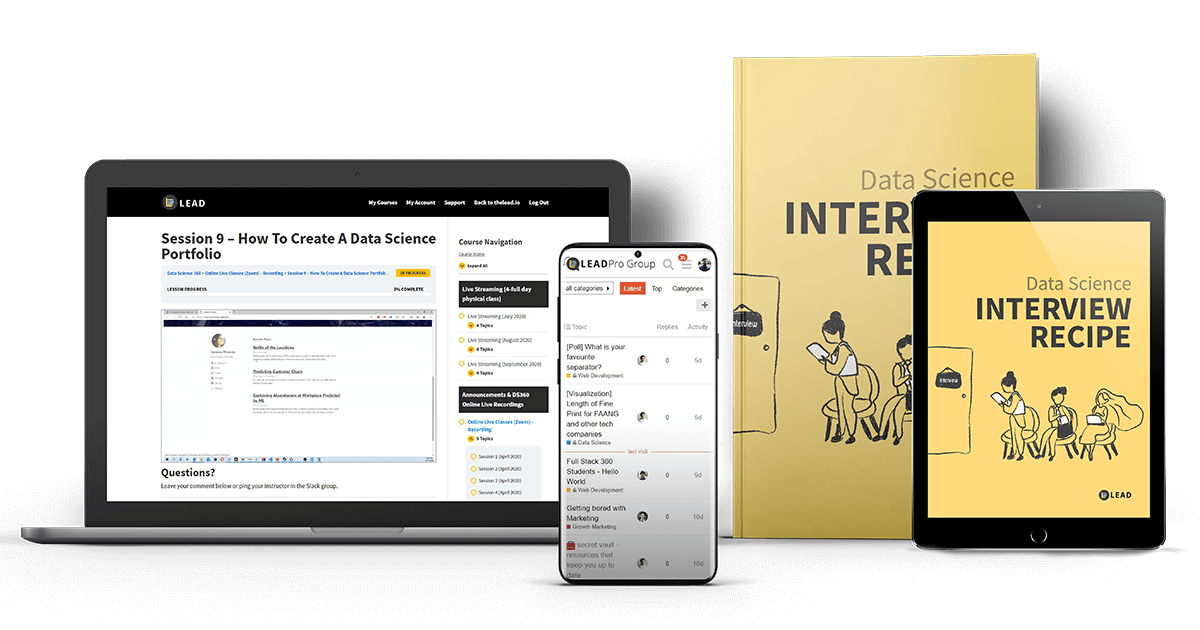
In this recipe kit, you will have tools that teach you the right way to answer interview questions, including:
- 45-Page Interview Toolkit (PDF)
- 30 Insider’s Interview Questions
- Training Videos
- Access to LEAD’s Pro Group
Get your Data Science Interview Recipe here: https://thelead.io/data-science-interview-recipe
By following our instructions before and during your interview, you will soon find an email attached with an offer letter 😉

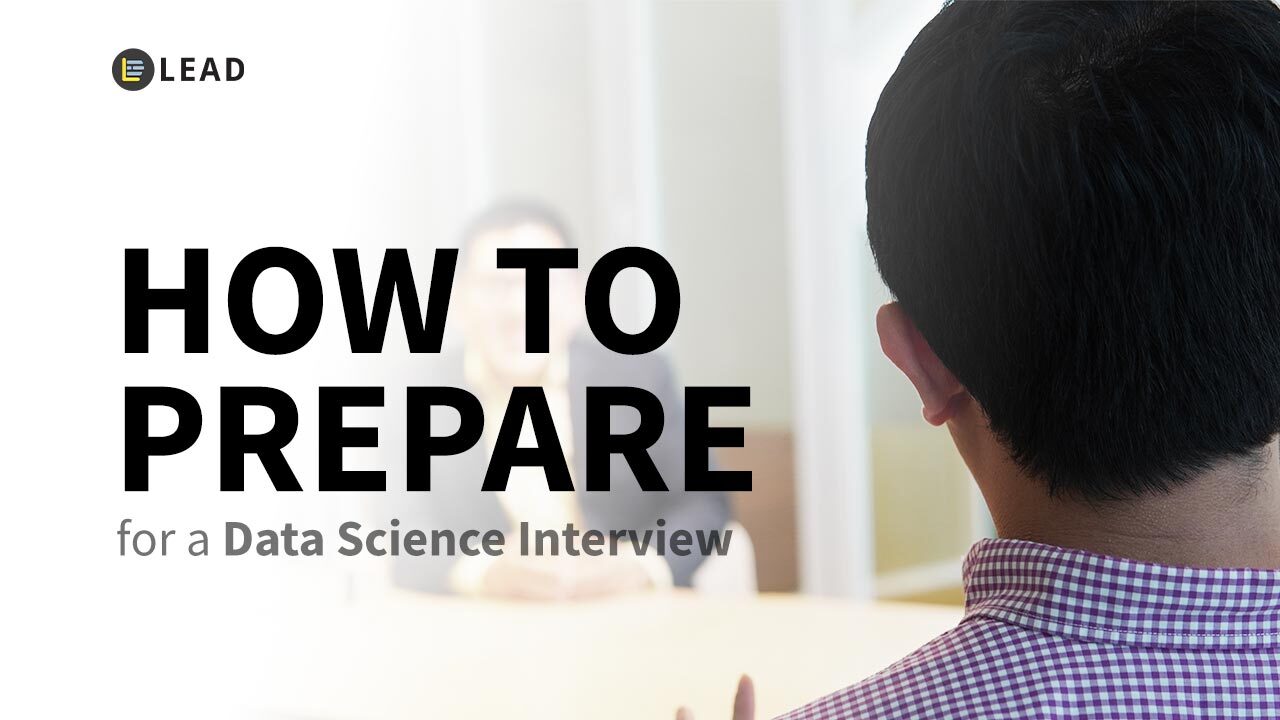

0 Comments